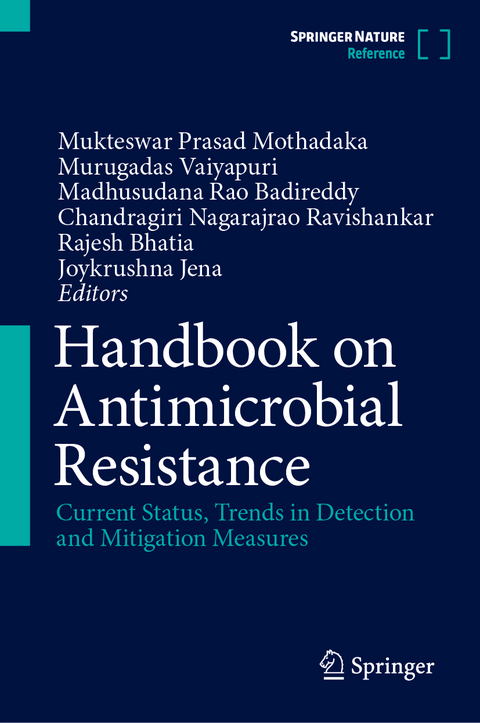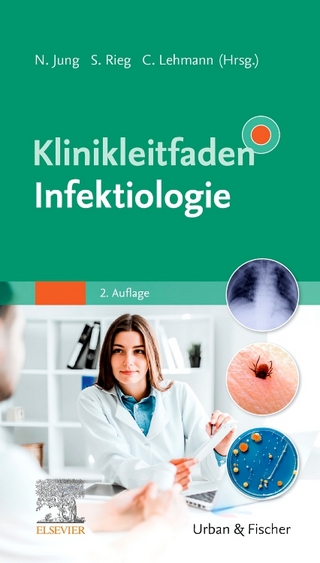
Handbook on Antimicrobial Resistance
Springer Verlag, Singapore
978-981-19-9278-0 (ISBN)
The book is meant for students and researchers in microbiology, medical microbiology, and public health.
Antimicrobial resistance (AMR) is a global public health threat. The menace of antimicrobial resistance is present across health, animal, agriculture, food, and environment sectors. It, therefore, requires an inter-disciplinary combat approach- the one health approach, envisaged by the FAO-UNEP-WHO-WOAH Quadripartite (Food and Agriculture Organization of the United Nations (FAO), the UN Environment Programme (UNEP), the World Health Organization (WHO) and the World Organisation for Animal Health (WOAH).
This comprehensive reference book provides a thorough understanding of antimicrobial resistance across different sectors. It presents deep insights and gives a global perspective on antimicrobial resistance for policymakers. The book offers essential and up-to-date information that enables researchers from multiple fields to design research on antimicrobial resistance. The book discusses molecular mechanisms and antibiotic resistance genesof significant antimicrobial-resistant pathogens, regulatory frameworks available worldwide, and mitigation strategies across the sectors, including probiotics, prebiotics, antimicrobial peptides, bacteriophages, phytochemical compounds, immunostimulants, vaccines, bacteriocins, etc. It compiles essays from leading experts in the field of antimicrobial resistance research.
The book is meant for students and researchers in microbiology, medical microbiology, and public health. It is also helpful for clinicians and policymakers.
Dr. Mukteswar Prasad Mothadaka is Emeritus Scientist, former Principal Scientist and Head of Microbiology, Fermentation and Biotechnology, Central Institute of Fisheries Technology (CIFT), under Indian Council of Agricultural Research, Ministry of Agriculture and Farmers Welfare, Govt. of India. He did his MSc and PhD in Microbiology with vast experience of 36 years’ on human health hazard bacteria and their control in fish and fishery products and initiated flagship programs on AMR. Developed, designed, installed and popularized community fish smoking kilns in NEH Region and transferred many a technologies of fish processing and microbial, hygiene and safety of fish, fishery products and fish curing environments benefiting hinterland women fishers, students, NGOs and government officials and University faculty. He has a total of 326 publications that included 10 Books, 134 peer reviewed national and international research papers; 10 Conference Proceedings; 3 Training Manuals; 17 Reports; 27 Training Manual Chapters; 8 Official National Language 4 Regional Language and 113 Abstracts. Recognized as guide for post graduate and doctoral studies in three nationally important Universities. He has provided research guidance to 17 students for PhD, MPhil and Master Degree programs. Reviewer for many peer reviewed International and National journals. Served as Research Advisory Committee of ICAR Institute, Chaired ICAR-CIFT Institute Biosafety Committee and member of Animal Ethics Committee. Presently serving as member of National Expert Scientific Panel on Fish and Fishery Products Committee and as subject matter specialist in different advanced selection programs, technical committees of Central and State Governmental Organizations. Carried out outstanding works in all of eight north Eastern states of India for twenty years by undertaking field studies, conducting National Training Programs, to students at all levels, NGOs and governmental agencies. Elected Fellow of Society of Fisheries Technologists of India and Life Member for seven National Scientific Organizations. Travelled extensively while participating in National and International Seminar/symposia and workshops. He is actively involved in, NAP AMR (National Action Plan of AMR, India), INFAAR (Indian Network for Fisheries and Animal Antimicrobial Resistance), KARSAP (Kerala Antimicrobial Resistance Strategic Action Plan) and APAPCAR (Andhra Pradesh Action Plan for Containment Antimicrobial Resistance). Dr. Chandragiri Nagarajrao Ravishankar is presently Director and Vice Chancellor, ICAR-Central Institute of Fisheries Education (CIFE), under Indian Council of Agricultural Research, Ministry of Agriculture and Farmers Welfare, Govt. of India and has 33 years of contribution to fisheries sector. He completed his Bachelor Degree in Fisheries Sciences, Post-Graduation in Industrial Fisheries Technology and Ph.D in Fish Processing Technology from University of Agricultural Sciences, Bangalore. He has participated in the First Indian Antarctic Krill Expedition. He has developed, popularized and transferred many processing and packaging technologies to the food processing industries and established India's first Business Incubation Centre in the field of Fisheries for the benefit of entrepreneurs. He has more than 260 publications to his credit which includes International and National research papers; authored 7 books and Guided 38 students for Doctoral and Master degree programs. Representing as subject expert in many technical committees of Central and State governmental organizations. He is the elected Fellow of National Academy of Agricultural Sciences, New Delhi; Association of Food Scientist and Technologists & Society of Fisheries Technologists and received many awards for excellence in the field of fisheries science and technology. He is a reviewer for many peer reviewed International and National journals and also recognized asguide for post graduate and doctoral studies in many Universities. He delivered number of talks as an invited speaker for several international organizations. Dr. Murugadas Vaiyapuri working as senior scientist at Microbiology, Fermentation and Biotechnology Division, ICAR-Central Institute of Fisheries Technology. He did his BVSC, MVSC in Veterinary Microbiology and PhD in Biotechnology and has experience in seafood and aquaculture safety since 2010. He has expertise in the microbiological examination of seafood for safety & spoilage, antimicrobial resistant (AMR) pathogens isolation, molecular characterization and resistant genes. Specifically worked in the Methicillin Resistant Staphylococcus aureus and Extended Spectrum Beta Lactamase producing E. coli. Since 2018 December working on assessment of Vembanad and Sasthamkotta Lake for AMRin India. Involved in the testing of fish and fishery products for OIE listed pathogens. Internal auditor and assessor as per ISO 17025: 2017 for biological testing as per NABL. He is a co-investigator of INFAAR & KARSAP projects of AMR. Member of the Institutional Biosafety Committee since 2017 and Institutional Animal Ethics Committee member since 2019. He has more than 40 peer reviewed publications to his credit. More than 50 abstracts presented in the national and international conferences. Published 1 book chapter and 15 training manual chapters for various programs. Ad-hoc reviewer for seven international journals and four national journals. Dr. Rajesh Bhatia is specialized in communicable diseases and is international Consultant with FAO on AMR and with ADB on Public Health. He is the former Director Communicable Diseases, WHO Regional Office for South-East Asia Region and Regional pivotal theme for AMR (2001-2015) is currently working with FAO (2017- till date) as Regional Consultant on AMR. Earlier, for 15 years he worked at the National Centre for Disease Control and as national focal point for AMR. He has authored several books and 145 scientific publications in peer reviewed journals, of which 40 are on AMR. Dr. Bhatia has edited special issues on AMR of IJMR and Regional Health Forum of WHO. He contributed to development of WHO Global Action Plan on AMR, National AMR Action Plans for India, Jordan, Egypt and Palestine and Indian Network for Fisheries and Animal Antimicrobial Resistance. He has been awarded Gold Medals for his contributions by Indian Vaccinology Association (1993), Indian Society for Malaria & Other Communicable Diseases (2012), Delhi Chapter of IAMM (2018) Dr. Joykrushna Jena is currently serving as Deputy Director General (Fisheries Science), Indian Council of Agricultural Research, Ministry of Agriculture and Farmers Welfare, Govt. of India. Prior to this, he served as the Director of the ICAR-National Bureau of Fish Genetic Resources, Lucknow, India for over five years. Dr. Jena possesses over 30 years of research experience in different fields of freshwater aquaculture and conservation genetics. Working in different aspects of freshwater aquaculture at the ICAR-Central Institute of Freshwater Aquaculture, Bhubaneswar, India during his initial career in different capacities, including as National Fellow and Head of the Division, Dr. Jena has contributed to the development of several technologies and research findings, including breeding, seed production and farming of diversified carp species; multiple cropping of carps; intensive carp culture; treatment of domestic sewage through aquaculture; cryopreservation of fish milt; and applied nutrition. He has operated over 20 research projects, including 10 externally-funded projects as Principal Investigator. As National Coordinator, presently he is operating the National Surveillance Programme for Aquatic Animal Diseases (NSPAAD) in India with the involvement of over 30 partner organizations. He isalso leading the Indian Network of Fisheries and Animal Antimicrobial Resistance (INFAAR) of ICAR for the control of AMR in livestock and fisheries sectors in India. Dr. Jena has published over 200 research papers in national and international journals of repute, besides several books and other publications. He is also serving as the Chairman/Member of several national and international level committees. Dr. Madhusudana Rao Badireddy presently works as Principal Scientist at the Visakhapatnam Research Centre of ICAR-Central Institute of Fisheries Technology (ICAR-CIFT). He did M.V.Sc in Veterinary Microbiology and Ph.D in Microbiology and has over 25 years of experience in the research areas of antimicrobial resistance (AMR) in bacteria, molecular characterization of pathogenic bacteria, bioprospecting of aquatic microbial resources, use of bacteriophages as natural antimicrobials, and innovative fish processing technologies. He has several credits to his research output. He has published 57 research papers in international and national peer reviewed journals, 50 popular articles, 10 book chapters, 15 training manuals, several extension pamphlets, brochures, edited 10 books, and made more than 100 presentations in various seminars, workshops and other fora. He has completed 22 projects as principal investigator/co-investigator. He received 5 awards during his academic and research career.
Default.- Status of AMR across Sectors.- Antimicrobial Usage.- Insights on Antimicrobial resistance in pathogens.- Drivers of AMR and recent trends in detection and characterization of AMR pathogens.- Mitigation measures across the sectors.-
| Erscheinungsdatum | 11.08.2023 |
|---|---|
| Zusatzinfo | 63 Illustrations, color; 13 Illustrations, black and white; XXIX, 1107 p. 76 illus., 63 illus. in color. |
| Verlagsort | Singapore |
| Sprache | englisch |
| Maße | 155 x 235 mm |
| Themenwelt | Medizin / Pharmazie ► Medizinische Fachgebiete ► Mikrobiologie / Infektologie / Reisemedizin |
| Studium ► Querschnittsbereiche ► Infektiologie / Immunologie | |
| Naturwissenschaften ► Biologie ► Mikrobiologie / Immunologie | |
| ISBN-10 | 981-19-9278-9 / 9811992789 |
| ISBN-13 | 978-981-19-9278-0 / 9789811992780 |
| Zustand | Neuware |
| Informationen gemäß Produktsicherheitsverordnung (GPSR) | |
| Haben Sie eine Frage zum Produkt? |
aus dem Bereich


